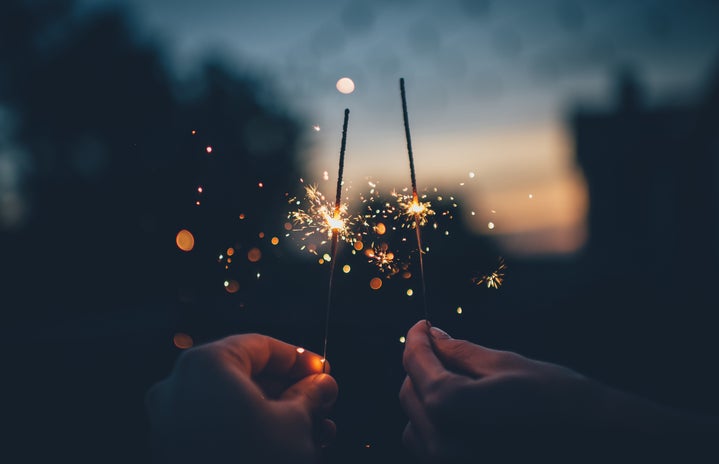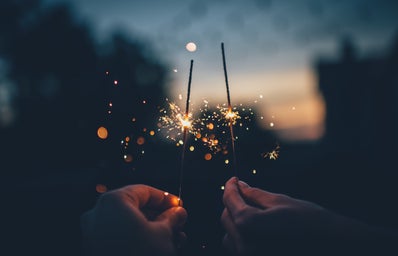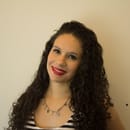There’s a reason The Bold Type is one of the most popular shows on television right now—and for many of us, one of those reasons is probably how we’re able to relate to each of these characters. Whether its Jane’s Type A personality, Kat’s journey to finding herself or Sutton’s work struggles, there’s a little bit of everything for all of us. (Plus, Jane, Kat and Sutton’s strong bond can’t be denied, and it’s the kind of friendship some of us have with our own besties.) And this, of course, is also thanks to the talented women behind these strong, bold characters—like Katie Stevens, who we lovingly know as Tiny Jane.
Her Campus caught up with Katie while she was on a break from filming to discuss the latest emotionally-charged episode, “Plan B,” those uncomfortable (but confidence-building) sex scenes, how she went from selling cupcakes at The Grove to landing on The Bold Type, and more.
Her Campus: In”Plan B,” the show dives into Jane’s personal life even further as she struggles with whether or not she wants to have children and everything that comes with that. Being a young woman yourself who’s engaged and probably thinking about these types of things yourself, how did the storyline affect you personally? What message do you hope fellow women get from the episode?
Katie Stevens: It was really vulnerable for me to film because I just came back from being engaged and my fiancé’s mother had breast cancer. So I had a lot to draw from, which was so crazy because the writers had no idea that Paul’s mom had breast cancer when they wrote it and I got the script for episode 6 last year when we learned that his mom had cancer. So in the scene when Jane’s saying all those things like, ‘I only remember my mom when she was sick,’ all those things were just crazy because those are the things that Paul had been saying. Being engaged and thinking about our wedding already is kind of hard because we really wish she could be there, but we know she’ll be there in spirit. Then, having to do an episode where we’re talking about like having to live without that presence of your mother… You know, I haven’t heard Paul say that that’s something that he’s fearful of but I know that it’s probably very true for so many people who have lost parents to cancer. I feel like for me, when I think about having kids, I look to my mom and I think about how my mom raised me and the experiences that I had and the memories that I have that I want to pass down to other generations. My daughters might have daughters and I can’t imagine not having those memories and them having to question, like, ‘I don’t remember what my mom was like, what am I going to do? How am I gonna handle it if I get sick and I wind up passing and leaving my kids behind?’ And I think that is like the most heartbreaking, difficult thing for anybody to have to deal with. So the fact that we get to talk about that…it was very, very vulnerable for me for obvious reasons.
HC: Those difficult but necessary conversations are really what The Bold Type is known for, and last week was another difficult one in particular when you guys dove into the topic of gun control. What was it like for you going into this episode, being on the side that’s anti-gun and having to tap into these heartbreaking mass shootings?
KS: I was honestly dealing with a little anxiety because of the topic of gun control and the pressing state of the world. I think we’re all nervous about how to do this episode and not sound preachy, and how to show the gray area in the right way. I was really excited and nervous about how [the scene] woule be perceived and I was so surprised after seeing all the comments on Twitter and everything. We had so many people say that it was nice to see the other side of it, because they had never thought about it that way. I think that’s what I probably love about our show so much, is that we start these conversations and we chose the gray area to show both sides and people can understand the view that’s different from their own because of watching the show. That’s really nice to start that conversation and to kind of help change people’s perceptions and ways of thinking so that maybe even though people disagree, a conversation can still happen and they can try to understand the different side.
HC: You guys did such an amazing job. I know that you and Meghan are really good friends in real life as well, so was it difficult to shoot these intense conversation scenes with her?
KS: Yeah, even when we did the scene where we were in the coffee shop talking about white privilege. You know, it just feels yucky. I don’t really like the scenes where we’re fighting. I prefer to do the scenes where we’re like drunk and eating ice cream on the couch.
It’s nice because we’re both coming from such a place of vulnerability and thinking about not only what we’re actually talking about on the show but thinking about, “Okay, well how’s my character going to be perceived? Are people going to hate me?” Because you just never know. So we do the scenes, we do the part and we just hug each other and reassure each other.
HC: What type of advice would you give to someone going through this with their best friend?
KS: I think, don’t stray away from your passions. At the same time, you don’t need to believe each other. Don’t just follow your friends. And just be you because there’s truthfulness and vulnerability from anybody coming forward and talking about what they believe in. Even if you might not agree, you still need to be open-minded and just listen to them. Even if you’re just listening to somebody for what they’re saying, also try to really understand where they’re coming from.
HC: This season was the first time Jane found herself in a place where she felt sort of lost after leaving Scarlet and then losing her job at Insight. Do you feel this has helped her grow as a character? What advice would you give to a young woman going through this right now?
KS: Yeah, I think for sure. I think it’s important to show characters and people on TV failing and show it as a failure, which I think is not easy for the girls. But I think that’s what we’ve done with Jane. You know, somebody who’s such a perfectionist and type-A and they fail. That was very difficult but very interesting just to see them try to pick up the pieces. I think everybody expected that when she went to try to get her job back, Jacqueline was just gonna say yes and that was going to be the end of it. But I was happy that we got to see her struggle. ‘Like oh wow, Scarlet’s no longer an option for me. What am I going to do?’ And even though it was hard and she struggled, she got to a place where she was doing fine. She didn’t get the job back at Scarlet and she was like, ‘I need to look forward. I need to move onto a different path.’ And that path led her back to Scarlet, but it was only because she was so okay with where she was at.
HC: Right, and I love that you guys did that. I feel like with many other shows and movies it’s kind of this fantasy version of reality where it would be like, ‘Yeah, come right back!’ But it’s not like that. You might never get that job again.
KS: Yeah, I always mess up once or twice a day, at least. So I don’t like shows that just show characters that are never messing up. Like, I just get sad watching those shows because I’m like, ‘Wow, I suck.’ So I’m excited to see more people who are failing to help me figure out that mess in my own life.
HC: What has really been the best part about playing Jane? Have you learned anything about yourself along the way?
KS: It’s so funny because I’m so similar to Jane in many ways, and one of the things that I’ve always found so charming is that I’m the one who’s getting all these sex scenes, because I don’t consider myself to be an overtly sexual person—like that’s something for my private life. Then I’d have to find this comfort in like, ‘Am I sexy?’ Like ‘sexy’? That’s not a word I’d use when someone asks me to describe myself. Like I would not be like, ‘I’m sexy.’ So I think it’s so funny. I honestly started to look at myself as confident and sexy because I have to do those scenes all the time. I have to sit in that vulnerability being on set and in front of a million people, just with a new song and scene. Even though I’m not actually doing any sort of sexual act, there are still vulnerabilities about being with another person and to trust the people around you and trust in your body, you know. And I think, for me, it’s really kind of helped me in terms of my confidence and in terms of self-love because when I prep for those scenes I’m hyper-aware of taking care of myself and listening to my body to just do the best I can. I’m also hyper-aware of the vulnerability of it, which is easy to play because I feel vulnerable. But I feel like having to do those scenes has helped with my real life, to start owning my sexuality and owning the fact that I am a beautiful and sexy woman. I have my fiancé, and I’m really open with him and tell him when I have to do these scenes and he’s open about it and doesn’t care, but I was talking to him and I was like, ‘It’s really nice to go on set and just be present in the vulnerability.’ And that’s a relief for me, and now I feel so comfortable in my skin even though I’m around all these people on set.
HC: Before landing this incredible role, and even before your days on MTV’s Faking It, we read that you were selling cupcakes in LA—talk about a huge turnaround. What words of wisdom do you have for young women in college or those just getting out of college trying to figure out where to go in life, or who feel like they’re never going to become successful?
KS: I think you’re super wrong if you think that you’re never going to become successful. I think the people that don’t become successful are the people who get into difficulty and don’t pursue past it because anything you want in life is hard. You know I did American Idol and after American Idol I didn’t become successful, and that was really hard because I got a sense that what success could be like. I was going on tour. I was going to movie premieres, and I was doing all these things. And then to come to the realization that I didn’t really have anything going on and my money was dwindling away… I’m just thankful that I don’t have parents who were like, ‘That’s okay, we’ll give you money to survive.’ They we like, ‘You have no money? Go get a job.’ So I had to find a job. At the time, one of my best friends worked at Sprinkles and she was like, ‘It will probably be more flexible for you to still be able to audition and do things like that.’ So I worked there and it was really hard for me because I felt like I had failed, and I felt like it was just an enormous setback. Not only that, but Sprinkles was in this place called The Grove, and sometimes it would get too busy so we’d have to park our cars in the CBS lot and I’d have to park in front of their ‘I got into American Idol’ sign. For me, that was like a stab in the heart. I was just like, ‘Wow, this is where I thought I was going to be. This is what I thought I was going to continue and now I’m here selling cupcakes.’ And there were people who would be like, ‘You look really familiar.’ And I’d just be like, ‘No, I don’t.’ I felt ashamed at the fact that I went and got a job, and I knew other former Idols who were still doing things under the Idol umbrella. They were like, ‘You know you could book more shows and you can make money using the fact that you were on American Idol.’ But I was so thankful that I did American Idol, and I’m still thankful to this day because I wouldn’t be on The Bold Type if I wasn’t on American Idol. But I think it was really important for me to establish myself as an artist first and foremost and kind of have American Idol be an afterthought. Because I never just wanted to be from American Idol. I wanted to be an actor, a performer, and then, ‘Oh, by the way, she was on American Idol.’
So that’s why I was like, ‘No, I’m going to get a job and work and figure out how I’m going to get to that point.’ I was going into auditions and I was getting good feedback but not being given any of the opportunities because I always had American Idol on my resume. Then finally, after three and a half years of feeling like a failure, I heard about this audition and I was like, ‘I’m never going to get this because that’s just how everything’s been. But I’m going to do my best.’ But they looked down at my resume and just saw me as this character and I’m just so tremendously grateful.
So if you have a dream, whether that’s to be a lawyer or a doctor or an actor, you can’t just say you’re going to be this and not expect it to come with hard work. Just keep your determinations up to get past hard times. The days that you go and you do like three auditions in the morning, you go and you work the job that you hate but you go and put a smile on and take that as an acting exercise. You just can’t give up, as cliche as that sounds. Once you give up, then that’s it. But if you’re able to put all of the work that needs to be put in and just keep your eye on where you want to go, then you’ll get there.



